Category Archives: Ethiopia
Screening Day – Ethiopia Fall 2018
My first trip to Bahir Dar, Ethiopia, with Children’s Surgery International was two years ago. Today was the first day of CSI’s fourth trip here. We started with all the excitement that the screening day brings. Do we have all the supplies? Are our interpreters here? Are our patients here?
Yes, we had supplies, and the few we were missing we could buy in one of the many tiny pharmacies surrounding the hospital. Yes, the interpreters were present and eager to help us. Yes, the patients had arrived, and the waiting area was full of parents and children. It was quite a surprise for me, because two years ago there were probably a quarter as many patients.
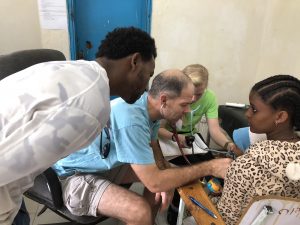
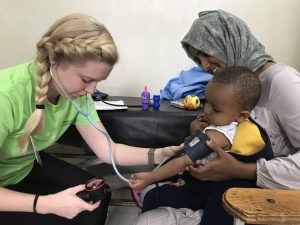
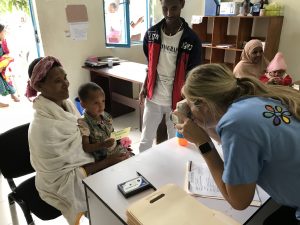
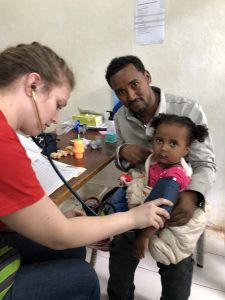
I started the day helping with vital signs on our young patients. As screening progressed, we identified infants who could not have cleft lip or palate repairs because they were too small for their age or because they were too young, including a three-day-old baby. Feeding children with cleft palates in particular is challenging for parents. This is when my role as a nurse educator with the team became necessary. Education is a key part of CSI’s mission – education for health care workers and also for families, to provide access to learning that may otherwise be unavailable to them. With the help of a trusted interpreter, we started teaching moms how to feed their babies with special nipples. The moms fed their babies and the dads were very supportive, asking questions and assisting the moms. We discussed that babies had to be a bit larger for surgery and would be seen at CSI’s next visit in less than six months. Although it was not the outcome they wanted, they understood why we had to wait. We will be eager to see them again next time.
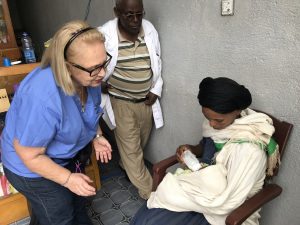
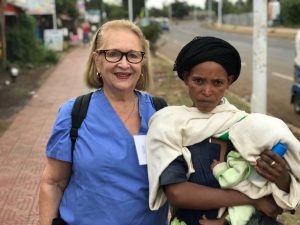
After evaluating 80 children, our three surgeons have scheduled about 60 surgeries, which will begin Monday. Tomorrow, we have a day of rest to enjoy beautiful Ethiopia, so our team will be energized for the week ahead.
Maria Rubin, RN ~ CSI Nurse Educator
Click here for more photos from Ethiopia Fall 2018
We are Ready – Ethiopia Fall 2018
The Ethiopia CSI team – 19 strong – has safely settled into Bahir Dar after hours of travel. Today the leadership team met with officials at Felege Hiwot Hospital to firm up plans for screening day tomorrow. We have noticed that the number of people waiting for services at the hospital has steadily increased over the years CSI has been coming to Bahir Dar, an indication of the significant needs here.
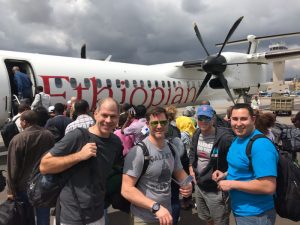
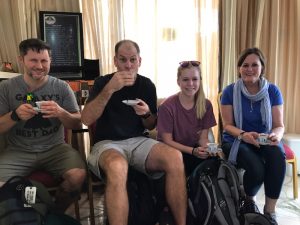
We were thrilled to learn that tomorrow is graduation day for approximately 150 medical students as well as the inauguration of the new hospital. Two important milestones which will help meet the growing needs in this region. Leaders from three neighboring countries are here to observe this happy occasion. The team capped off the day by dining together and forging new friendships and professional bonds. We have a strong team and are ready to get to work.
Wrapping up an amazing week… until next time!
Sally Lannin ~ CSI Team Member
What a trip! A huge success in every way possible and a perfect example of what CSI strives to do: come to an underserved country, find committed local medical and nursing staff who are literally starved for skills and training, model quality health delivery on all levels, and help build capacity. And here at this site, we have it all. Thanks in large part to Dr. Woubeshet Ayenew – a Minneapolis-based Ethiopian who knew of Felege Hiwot Referral Hospital and its needs – we found Dr. Melesse Gebeyehu, a surgeon born and raised in Bahir Dar, whose mission is to gain surgical excellence and impart it to other surgeons at Felege Hiwot Hospital.
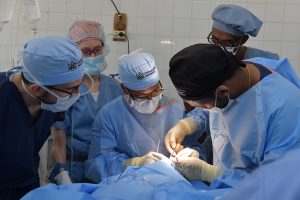
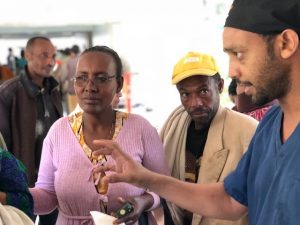
Tonight the entire team was invited to a thank you dinner hosted by top administrators at the College of Medicine and Health Sciences at Bahir Dar University which sits right next to the hospital. Medical students, residents and nurses in training have observed and participated in care as much as possible. There is a large shortage of Ethiopians going into nursing and some specialty areas which affects care. For example, in a U.S. post-surgical recovery area we have 1 or 2 medical staff assigned to every patient coming out of surgery. Here it’s 1 to every 8 patients. The farewell dinner was a great chance to discuss what could happen differently on our next trip to make CSI’s time here even more helpful.
If you had the chance to spend 15 minutes with us as a family walks up in the only clothes they own, with the child they value and love as much as we do our children, you would be shocked at the need. Mostly they live on rural farms without access to television and often even radio. They are farmers, and their hands tell the story of years of hard labor. Somehow, they get word of surgeries provided by teams of CSI volunteers working side by side with their Ethiopian counterparts. And it is free?!?! They take whatever transportation is available to make the 30-275 km trip, navigate the chaos in the halls of the hospital to find, finally, the right people to ask. This in and of itself is a miracle.
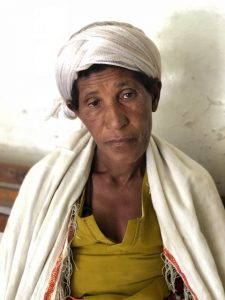
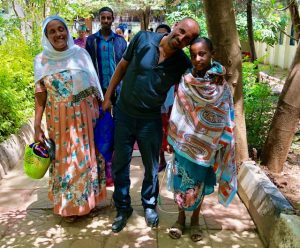
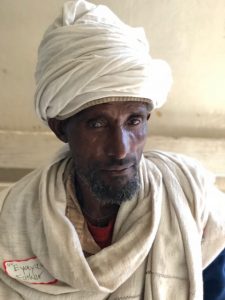
Take Metadel, a 15-year-old young man who after years of relentless mocking in school, dropped out altogether. His ‘friends’ said “…don’t get near Metadel or you will catch the contagious disease he got as a curse from God!”. Thankfully his 27-year-old brother asked a friend in Bahir Dar to let him know when CSI and the free surgeries were next in town. He got his younger brother Metadel to promise to return to school if he got surgery, took time off from his own work as a teacher, and travelled 80 km from their rural home to the ‘big city of Bahir Dar’ to find our screening line. After surgery both young men were speechless, with an outpouring of gratitude. Imagine – access to this surgery is the best thing that has ever happened in their lives and hopefully the turning point that gets Metadel back in school.
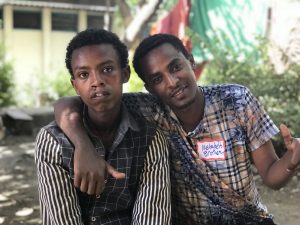
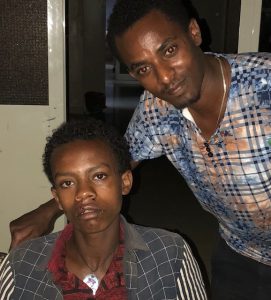
On our last day, as we wind up this mission of 59 surgeries, we refelct. We evaluated 88 patients on screening day and another 30+ who walked in each day. We especially want to thank our partner, Dr. Melesse – This soft-spoken surgeon is the backbone of our ability to weave a system of education and training here. He is skilled enough at this point to work in many places with far more prestige and pay, yet Dr. Melesse is fully committed to giving to the poorest people in his hometown of Bahir Dar. He works every day in utter chaos, with 50-60 patients waiting to see him in his clinics, for $600/month. Moonlighting a bit on the side to be able to afford to send his children to a private school, this fellow is amazing. He spoke of his gratitude to CSI at the dinner by saying “I just have no words to express how grateful we are for you people with whom we share nothing but a common caring for humanity, especially for these people of Ethiopia who have nothing.” Dr. Melesse was a product of public schools up until medical school and is ‘of the people’. He’s working on building the skills of his colleagues too – He has found fellowship opportunities in South Africa for 3 hospital surgeons to speed up their skill acquisition along with CSI’s visits twice a year.
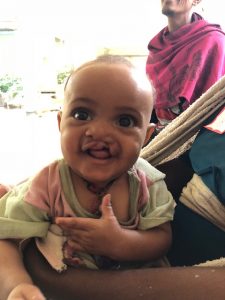
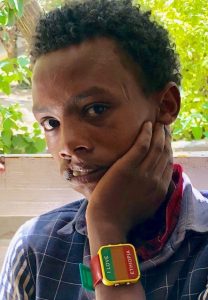
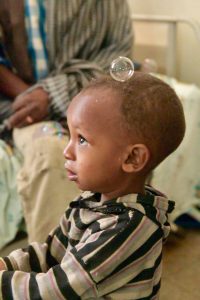
Our bags are packed, and we leave for the flight to Addis before our very late-night flights to various connecting cities to get back to the U.S. Every one of us has benefited from the ‘reboot’ this trip has given our own lives – perspective, appreciation and a commitment to do everything we can for these beautiful Ethiopian people.
A Picture is Worth a Thousand Words
From CSI Team Member and photographer, Tom Northenscold
A face I will never forget. This teenage girl suffered taunts all her life over her cleft lip. While the surgeons cannot take away that pain, they can repair her cleft lip in a masterful way.
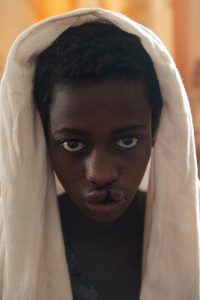
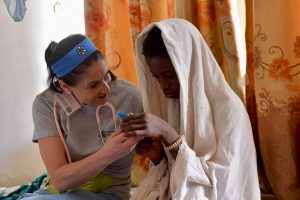
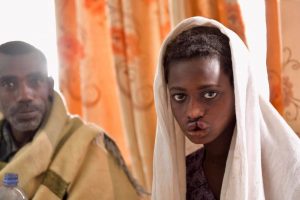
Wednesday – Lube Tech Brings Smiles
Margaux McClure ~ CSI Team Member
Philanthropy Coordinator at Lubrication Technologies Inc.
It’s truly another world here in Bahir Dar. Today we saw a man come in with an arrow going straight through his arm. He sat the entire day patiently waiting for help. Being non-medical, I have never seen anything like this, let alone watch a surgery take place. I feel so blessed to be here and have this experience. Each day I think it will become less shocking, less miraculous – and each day never ceases to wow me. I watch in awe as our unbelievable medical team nonchalantly changes lives – brushing it off like it’s no big thing. They’ve been giving me small jobs like holding the babies after surgery and calming them as they wake up, yearning for their mothers. They want me to feel important, they’re the real heroes though.
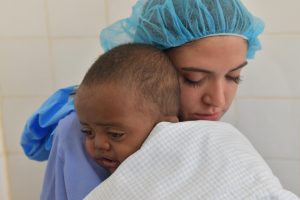
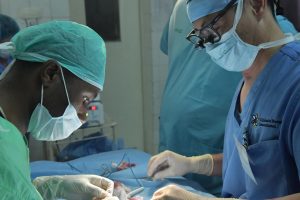
Today marks the kick-off of our official Lube-Tech Half-Day of Smiles. Employees at my company have been hard at work for the past month to raise enough money to sponsor a half day of CSI’s week here in Ethiopia. This amounts to about 9 life-changing surgeries plus the medical training that goes with them. I need to give a shout out to Lube-Tech employees, husband and wife, Cathy and Mark Morse. They selflessly put on an entire fundraising lunch for our company with a free-will donation option. Cathy and Mark worked tirelessly, staying up nearly all night to purchase and prepare all the food; spending their own money; and using their personal time off to execute the lunch. They were able to raise a total of $1,200! Cathy also put together a Lube-Tech Cookbook that employees could buy – the proceeds all went towards our fundraiser to help these kids and families here in Ethiopia. Thank you, Cathy and Mark – I wish you could be here to experience the difference you are making in these children’s lives as it is something quite special!
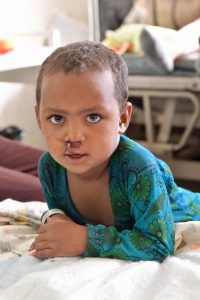
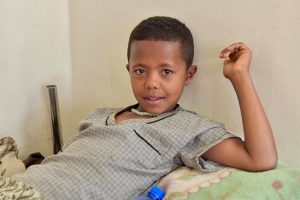
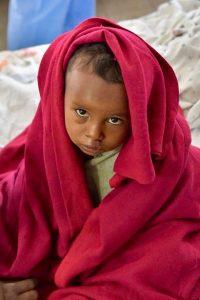
Celeste, one of the CSI nurse anesthetists, made huge strides with two Ethiopian anesthesia providers today. The two Ethiopian anesthesia providers worked side by side with Celeste, who was pleased with the opportunity to work with them. Celeste says their collaboration will help to enhance patient care in the long run!
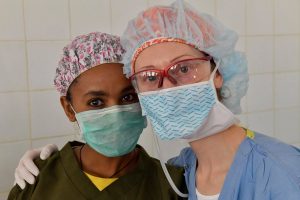
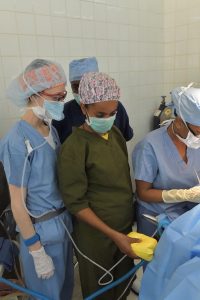
I’ve always hated going to the doctor, but after this week I see how much respect I owe the medical profession and how fortunate we are in the U.S. with our healthcare system. I strive hard to not fall for the perpetual curse of American ethnocentricity, but when it comes our medical knowledge and expertise, we are doing something right!
Waiting, Hoping, Praying
Sally Lannin ~ CSI Team Member
Surgery day two: We arrived again to a jam-packed hallway – a combination of our registered patients, hopeful potential patients, and an assortment of supportive fathers, grandmothers, best friends who helped those in need find their way to us.
At the gateway point here the Medical Records station greets each person who comes through; today a man and his daughter with a cleft arrived after walking 9 hours to reach a bus which took them most of another day to get to the hospital.
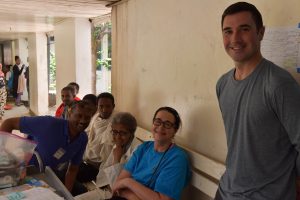
Eyayaw, a 25-year-old young man whose aunt lives in Bahir Dar heard CSI was coming to town. He came by bus despite living 200 km away. He was born with a partial cleft and has been mocked since he was a child. He said he feels “lots of happiness” now that his lip will be fixed. He said “kids here give you all kinds of names like “split lip”. His father is a priest who accompanied him, praying for a safe and positive outcome while his son was in surgery. After surgery the first thing he asked for was a small shard of mirror to see the results. Eyayaw hopes to go to University of Bahir Dar and study Economics.
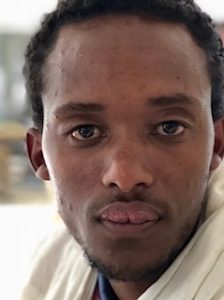
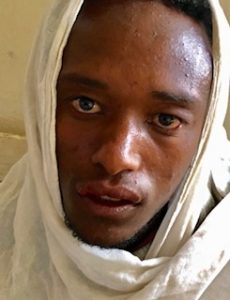
Waiting – Hoping – Praying
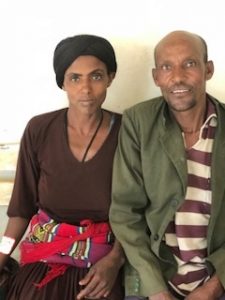
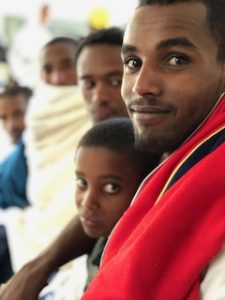
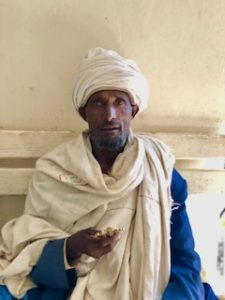
Today we also had a mother, who’d given birth just hours before, arrive with her baby boy and his cleft lip and palate. Too young for surgery this week, patient educator Jan Gauger taught the family how to feed the newborn using a special bottle.
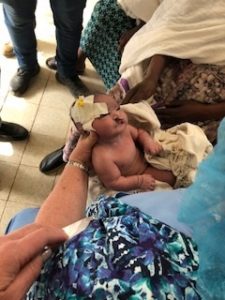
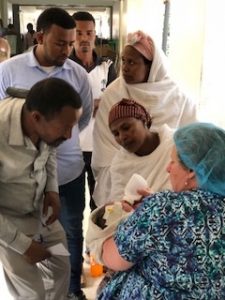
Tiny miracles are many per hour in a place like this. But so are the heartbreaks. Very poor, in threadbare clothes, these beautiful Ethiopian people work very hard for things we take for granted: clean water, electricity that stays on, clean hospitals are all not part of their lives. I saw a hospital patient have the head of his bed raised by putting a giant rock under the flimsy foam rubber that was his bed. But despite the hardships, people readily share, say “hello” as you pass by, wave and smile.
And what smiles! Absolutely amazing.
Surgery Day 1 – Complete
Karen Jordan ~ CSI Team Member
Whew the last two patients are in surgery as I type at 4:45 pm. The first day of surgery is coming to an end and it has been overwhelming yet fulfilling, chaotic yet successful, and heartbreaking yet heartwarming. The day started bright and early after a night of sporadic electrical outages. The surgical teams headed over first to get ready for the day, followed by medical records and the pediatric team. We were greeted by a crowd of patients and their families, in addition to dozens of people hoping to be added to the surgery schedule. As we were trying to get everyone organized, the surgeons and nurses were trying to find basic items like sanitary wipes while testing their spur of the moment solution to missing shoe covers (shower caps over their shoes).
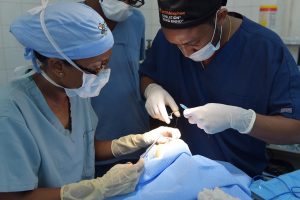
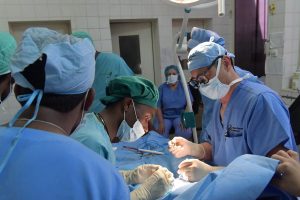
The first operations started around 8:45. While it eased a bit of the chaos outside, we were still dealing with figuring out who was who and tracking down missing patients. My heart went out to the little ones who hadn’t eaten or drank anything since midnight and you could see how difficult it was for their mothers to not breastfeed them. With 13 operations scheduled, we had to complete intake for the day then turn our attention to the more than 20 families who arrived hoping to be added to the week’s schedule. Unfortunately, many of them had to be told to return for CSI’s next trip in the Fall, however 12 were screened and the surgeons will try to add them to an already full week. Many of these families were waiting for us when we arrived at 7:20 and we were finally able to get them seen by the surgeons and pediatricians at the end of the day. It was amazing to see how patient these young children were with no toys or video games or iPads to keep them occupied.
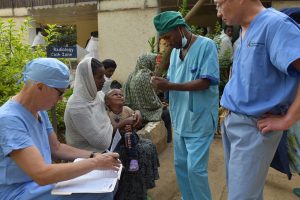
I took a break from the medical records charts to spend a couple of hours playing with the waiting children. They are all adorable, smart and willing to make friends at the drop of a hat. I was cranking out origami balls and birds and even the youngest wanted to help make them while the older ones quickly learned how to fold the shapes themselves. We moved on to cat’s cradle and, the universal smile-getter, bubbles. It was wonderful seeing their smiles and hearing them laugh given the grim surroundings of the hospital environment and the concerned families.
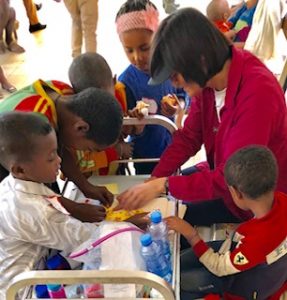
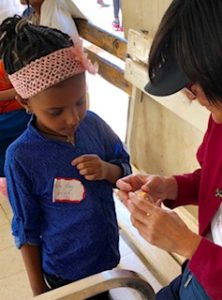
I was nabbed by one surgeon who had been referred to a current patient in the hospital—a 25-day old baby in NICU who needed attention from our urology surgeons. We went to NICU which turned out to be a gurney in the outdoor hallway. Thankfully the surgeons were able to add the baby to the schedule at the end of the day. His mother sat across from me with tears silently rolling down her face; can you imagine giving your 25-day old baby to a set of strangers who don’t even speak your language for an operation? Her joy and relief when he emerged sleepy and safe were memorable.
The surgeries aren’t the only value CSI brings to the Ethiopians. One young mother brought her baby who had been born yesterday but couldn’t nurse because of its cleft lip. Although the baby was much too young to be operated on, the team mobilized to produce special bottles designed for cleft lip babies who can’t produce enough suction to nurse successfully. James, CSI logistics lead, ran into town to buy some formula for the baby and Jan, CSI nurse educator, spent 45 minutes instructing the family how to mix the formula and use the bottle. The relief on the family’s faces when the baby could finally drink the formula was evident. Although this sounds simple, we had seen a seven-month old baby on Saturday when we were doing screening who hadn’t gained any weight since birth due to its cleft palate. It brought home to me the many ways CSI impacts lives here.
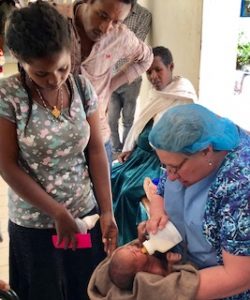
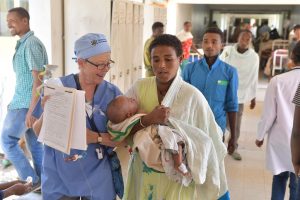
We barely had time to eat or drink but I wouldn’t have traded today’s experiences for the world. I’ve had an intimate glimpse into these families lives and I have seen firsthand the impact CSI’s dedicated medical team make for these patients. The best feeling was watching the doctors walk out with babies in their arms after a successful surgery and hand them into their parents’ arms, safe and sound and healthier than before. I remain deeply impressed by the CSI team here—their dedication and hard work under very difficult conditions, their flexibility and creative solutions to challenges, and their warm and deep compassion and care for the patients and their families are inspiring. I can’t wait for day two!
Karen Jordan, CSI partner and volunteer, assigned to support Medical Records and loving the experience!
Sunday – Time to plan, rest and explore
Wyn Huynh, CRNA ~ CSI Team Member
On most CSI trips, especially where teams travel a great distance, we try to build in time to rest and explore the local sights and culture. Today we did just that.
Through my experience of living in different cultures that speak different languages, I have learned that a little effort in learning to speak the local language, even a few words, and understand some of its culture and traditions will get you a long way.
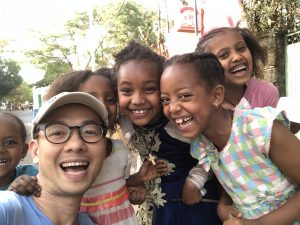
We know that in healthcare, trust is an important aspect between the provider and the patient. Could you imagine what it is like for these parents to hand their beloved child over to a foreigner like me – a nurse anesthetist, who speaks not a word of the local language, to put their child under anesthesia? I have found through my years of giving direct care to patients who do not speak my language, that if I can utter simple words of “hello,” “how are you” and “thank you” in their language, a whole world will open up and the trust relationship will soon be a reality.

On mission trips with CSI, team members occasionally have the opportunity to learn and immerse in the host country’s culture during the trip. Before our long surgery days in the week ahead, we had a chance to tour the city and visit a couple of monasteries, located on islands on beautiful Lake Tana. Lake Tana is a large body of water on the shores of Bahir Dar City – it is the origin of the famous Ethiopian river, the Blue Nile, and flows north over 900 miles, to join the White Nile at Khartoum in Sudan. Visiting the monasteries was so interesting – Faith is an extremely important part of Ethiopians’ lives. Nearly half the country is Christian Orthodox, mostly in the northern regions and about 40% are Muslims, mostly in the eastern, western and southern lowlands.
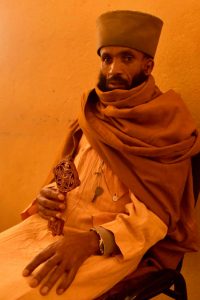
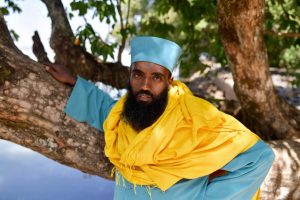
As of today, I was able to greet people in Amharic (one of the most widely used language in Ethiopia) and introduce myself – ready for the week. I feel good and a little closer to my Ethiopian people when I see their eyes perk up or giggle as I utter “selam”.
Screening Day – Ethiopia Spring 2018
Ellen Reynolds, CRNP ~ CSI Team Member
Families – parents and children. All over the world, there is a bond that surpasses culture and is visible to anyone who wants to see it. Today was our first glimpse into the bonds between Ethiopian parents and their kids.
There were parents and kids waiting for us today when we arrived at the hospital at 6:30 a.m. Some of them had traveled great distances and knew they were likely to be spending the next several days at the hospital, perhaps sleeping in a single bed with their child, or maybe sitting in a chair as their child recovered in a bed shared with another patient. They were proud of their children, often giving a big smile as we complimented their child on a pretty dress or a cute t- shirt. When they saw cameras come out, parents smiled and pointed to their child – “Take his picture!”. The parents as well as the kids delighted in seeing themselves – It was obvious that some had never before seen their own face in a photograph. The concern on their faces was evident when they were ushered into an exam room to see the surgeon, wondering if their child would be found healthy, strong, or big enough to go through the surgery they hoped would be life-changing.
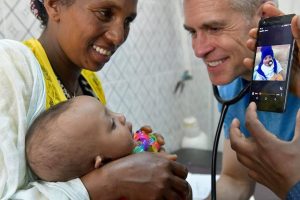
Our team’s goals for today were to identify those children who could safely undergo specialized surgery to correct facial abnormalities which often cause delayed growth or social humiliation, as well as those children with urologic problems that not only cause embarrassment, but also the real possibility of kidney disease. These parents are so hopeful! They are sensitive to their child’s fears and, at times – terror, regarding the strange white faces, examination, and use of everyday equipment such as stethoscope, thermometers, and blood pressure cuffs.
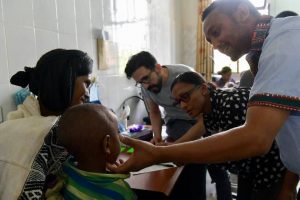
There were tears – From parents of the 6-week old baby too small to undergo complex urologic surgery, to the parents whose child was found to have significant signs of a heart disorder and would first and foremost need to see a cardiologist.
But there was a lot of joy. We screened more than 80 children and scheduled nearly 60 surgeries. We worked hard to show our respect for these families – to show we appreciated them and to share our confidence that their child would be on a path to a healthier and often happier life after this week’s surgery. There was play, with children chasing after bubbles and holding tightly to a squeaky duck toy or a plastic zebra. There was laughter and smiles. The hope was palpable. Parents and children. All over the world. We have more in common than not – it’s going to be a great week.
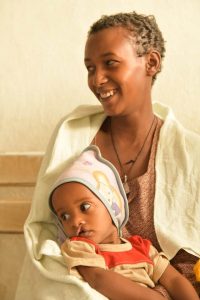
All together and ready to roll – Ethiopia spring 2018
Our team has safely arrived at Bahir Dar, Ethiopia! Team members hail from eight different states, but today, after nearly 25 hours of travel time and an overnight in the capital city of Addis Ababa, we are all together in Bahir Dar. Many team members are veteran CSI volunteers; eight volunteers are new to CSI. What a treat it is to welcome enthusiastic new volunteers.
Joined by our incredible partners at Taitu Tours, Bahir Dar University and Felege Hiwot hospital, it’s going to be an exciting week. This is the third CSI trip to Ethiopia, building on previous relationships with local professionals. Our team members will be working side-by-side with local surgeons and nurses, and our CSI nurse educator will be leading classes all week for local students and possibly families.
A few team members met with local hospital administrators and clinical supervisors today to discuss the details of the week, making certain that they can accommodate the patients we will be seeing and the care they will be receiving. We understand that our work may challenge their resources, as they are already extremely busy meeting the needs of their own patients. We are honored to be the guests of Bahir Dar University Hospital – Felege Hiwot. This teaching hospital is associated with the university and serves 5-7 million people in the Amhara region.
About 80 children have been identified by local surgeons as potential candidates for surgery. Tomorrow is screening day, when we will evaluate these children and determine which are ready for surgery this week. We are excited to be doing both ENT and urological surgeries. We also plan to deliver much-needed tools and equipment to our surgical and medical partners – items essential to performing these surgeries that are readily accessible in the U.S. but not in Ethiopia.
Sunday is a rest day and a chance to explore the beautiful city of Bahir Dar and some of its rich history, including the open-air markets, Lake Tana and more. This is an arid environment, located on Lake Tana at the headwaters of the Blue Nile River. The weather is lovely, sunny and about 85 degrees.
This week in Bahir Dar is all about transforming children’s lives and empowering local medical professionals through education and training. Life-changing surgeries will allow children to flourish in their communities, without the stigma that often accompanies birth abnormalities. Working closely with medical and surgical professionals will allow the work that has begun here to continue even after our team leaves.

